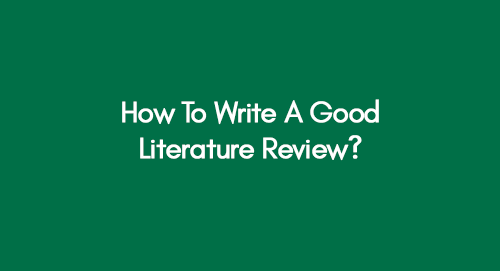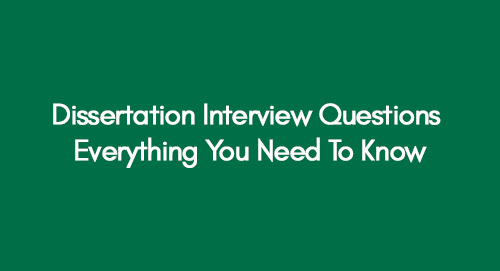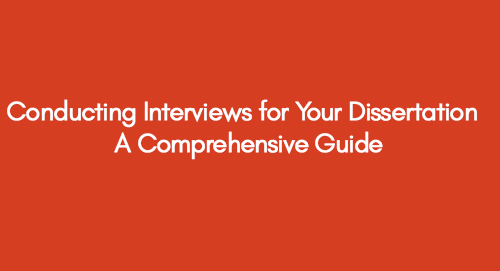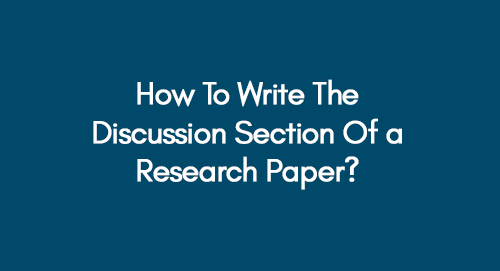Are you worried about how to write a good literature review? A Literature review has much more to it than simply being another subheading in your research report or dissertation.
It serves as the important basis for your research. It is a formal piece of writing in which you examine the theoretical framework, guiding principles, and presumptions currently in use and utilize that analysis to inform how you will approach the research issue. Curating and writing a compelling literature review strengthens your research's perspective and credibility while making your analysis more concise and well-organized.
Explore Current Dissertation Topics Here
Learn About Writing a Dissertation with Examples
Writing a literature review is a difficult task, though. It involves substantial reading and considering market trends, technology advancements, and political shifts, all of which can occur quickly.
Literature Review: A Prospective Research Collection
A literature review is an examination of academic materials on a particular subject. It gives you an overview of what is known now, allowing you to spot pertinent ideas, approaches, and gaps in the prior work.
A literature review is written in five steps, which are as follows:
- Find relevant articles
- Evaluate the sources
- Analyze the concepts, arguments, and gaps.
- Demonstrate the structure
- Compose a literature review
Learn About Writing Research Methodology Here
Find Tips and Techniques for Result Section Here
To present a complete overview of the information on the topic, a well-written literature review includes more than merely synthesizing the sources; it also analyses, summarizes, and critically assesses them.
Purpose and Importance
A literature review is intended to assist your readers in comprehending the significance of your research question and how it fits into the general knowledge field. Researchers use it to create a background, develop their arguments, and prove the need for their research.
The literature review is an essential component of research papers since it assists you in the following:
- Learn everything there is to know about your proposed study and the field.
- Show that you are acquainted with recent developments and changes in your field of study.
- Determine how your study connects to or expands upon the corpus of existing information and how it could aid future research.
- Explain the applicability of your theoretical framework and research approach in further detail.
- Determine and emphasize the knowledge's weaknesses and gaps and what needs to be changed.
- Tell readers how your research differs from others or how it advances the field of study.
3 Major Components of the Literature Review
Let's start with how to write a good literature review in an essay-like format. An essay-like format is used for literature reviews. The introduction highlights the research topic and details your approach to address it. Body paragraphs in the literature review provide in-depth knowledge about the topic under investigation. The conclusion section follows, restating the research question and summarizing the learnings you gained from your study.
The length of a literature review is mostly determined by the kind of research it is being composed for. It could simply be a few pages long for a brief paper, but it's sometimes a whole chapter for a large piece like a thesis or dissertation.
Formatting
- Introduction
- Give a brief introduction to the subject, theme, or question.
- Choose a focused target for your work.
- Describe your approach and reasoning. How did you select the sources you used and excluded? Why? What's the structure of your review?
- Talk briefly about the broad trends in this field's published scholarship.
- Clarify why you chose to write the review.
- Main Body
- Find the most effective review arrangement strategy.
- Summarize sources by including the most pertinent information.
- Respectfully and impartially comment on and assess the studies.
- Only use direct quotations when necessary and in moderation.
- Conclusion
- Keeping your topic in mind, summarize the key results from the sources you've read.
- Determine any areas that require more investigation by evaluating the usual state of information in this field (for example, gaps or shortages in the research, inconsistent findings).
- In your conclusion, make a link between your issue and a broader field of study, such as the discipline.
Learn How to Write a Perfect Introduction Section
Explore the Best Way to Write Conclusion Section
Best way to Style Your Literature Review
The same formatting requirements apply to a literature review as to any other academic paper. Those entail using clear, formal language without any contractions or colloquialisms and maintaining a balanced perspective in all circumstances.
Use the past tense to explain earlier studies on your issue. While using the present tense to elaborate your perspective to set your analysis apart from other scholarly research in the field. For instance, you may mention that a certain author did an analysis or that past scholars influenced them in the subject. Still, you might also mention that you are experimenting with various research techniques and formulating specific questions.
Appropriate Length to Craft an Efficient Literature Review
The literature review tends to incorporate 15% to 40% of the work in ideal circumstances. Therefore, the minimal word count for a 10,000-word research paper may be 2000.
It mostly depends on the article you are composing, from a whole chapter in a doctoral thesis to a piece of the introduction in research articles and a comprehensive review paper that looks at the previously existing research on a subject.
The kind of study you are conducting is another deciding aspect. Compared to primary research projects, the literature review part is typically lengthier for secondary research projects.
Things Not to Include to Avoid Poor Writing
In four simple stages, a poorly done scientific literature review might disprove a research thesis:
- If you cannot show that you did the necessary research, you lack the authority to suggest more studies.
- You cannot create a logical framework for the content you intend to convey as the basis for your work without mapping out the depth and breadth of the already accessible material.
- Without a thorough explanation of the material, it is impossible to defend the outlook of your planned research. Are you explaining a gap in the literature, resolving flaws in someone else's work, or even extending an issue in depth to a larger or different sample population?
- You lose context while attempting to evaluate any of the already published content if your literature review isn't thorough.
Practical Tips for Writing an Effective Literature Review
These practical tips for writing an effective literature review will help you become a pro at literature review writing. Give a brief description of the literature review's objectives.
Knowing the research question or topic and the format you choose for your literature review are the first steps in writing a review of the literature. Make sure you fully comprehend the study subject or ask for explanations if necessary. Before you begin writing, you must be able to respond to the following questions:
- How many sources to cite?
- What kind of sources should be examined?
- How much of each source must be evaluated critically?
- Should a critique of the sources, a summary, or both include?
- Any background material or definitions are required?
You certainly won't be able to read the entire research article in detail. Therefore, rather than attempting to gather every piece of information, you must examine which research sources are most similar and seem relevant to your selected area.
What subject or issue has the author been explaining and debating? And other questions like these should be addressed as you examine the sources.
- What does the term "important aspects" mean?
- How well-explained are the ideas, strategy, and methodology?
- Whether a traditional or novel, inventive strategy was applied in the study theory?
- How accurate are the article's major conclusions?
- How does it relate to various sources on the specific topic?
- What issues with the theory does this research article raise?
- What potential advantages or contributions does it make to the field?
Always keep in mind to only use reliable, legitimate sources. It would be ideal if you consistently used references from other sources to support your theories.
Always note significant facts or material that you may include in your literature review immediately. It will assist in preparing an annotated bibliography or citation section and aid you in preventing plagiarism risks.
Conclusion
Learning how to write a good literature review can be challenging, but you can master it by following the above-mentioned guidelines. By synthesizing and analyzing relevant sources, a literature review demonstrates the researcher's depth of understanding, critical thinking abilities, and mastery of the subject matter. A good literature review showcases the breadth of existing research and highlights the researcher's ability to interpret and integrate information effectively.
Explore the following topics:
- Learn How to Write Review Article: A Comprehensive Guide with Examples
- Literature Review: A Detailed Student Guide on How to Write a Literature Review
- How to Write a Dissertation Literature Review?
Contact Premier Dissertations to help craft the perfect literature review for your next academic paper.
Get 3+ Free Dissertation Topics within 24 hours?





























